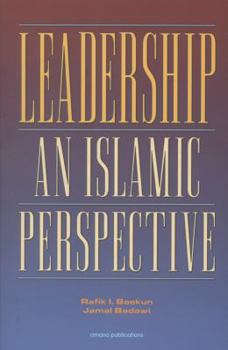Leadership: An Islamic Perspective
No Synopsis Available.
Format:Paperback
Language:English
ISBN:0915957949
ISBN13:9780915957941
Release Date:February 1999
Publisher:Amana Publications
Length:150 Pages
Weight:0.60 lbs.
Dimensions:0.4" x 6.1" x 9.0"
Customer Reviews
1 rating
"Must Read" for those working in Muslim organizations
Published by Thriftbooks.com User , 19 years ago
I came across this book as a nice complement to the other books on leadership that I have been reading in part due to my small business association as well as the completion of my MS in education administration. Thus, being familiar with the current literature on the subject, I very much enjoyed the synthesis this book brings from the Islamic perspective. The authors have obviously done their homework on the subject at hand, offering a healthy connection between contemporary writings on leadership in general with Islamic principles and healthy examples of Muslim leadership from the Islamic legacy. One of the areas a non-Christian reader will often encounter in the leadership literature is the role of religion, faith, or prayer - which is usually presented in the Christian context. As a Muslim, I adapt these to my own situation by applying what is relevant in the Islamic context. Often I dream of a day when modern Muslims will begin to contribute to this genre of literature, as I believe we have much to offer - and in this book, I was not disappointed. Chiefly, the book espouses leadership rooted in Islamic values and aimed at effective teamwork while mentoring new leaders from within. It is balanced in that it helps address difficulties encountered in common scenarios. The one most common in Muslim organizations occurs when leadership is too directive. However, I also found the material on the opposite scenario to be helpful as well: when leadership is so non-directive that followers are left without any leadership at all. For example, in discussing delegation, the authors caution: "delegate, but do not abdicate". They also discuss how gauging the maturity level of followers is important to determining the appropriate style of leadership. For those whose tendency is to resort to heavy-handed management, the book serves as a crucial guide to developing a climate of teamwork and mentoring. For those who tend to trust subordinates in their abilities from the beginning, there is beneficial advice as to how to cultivate this ideal when it is not automatically present. My only caution is when it comes to the use of the term "Islamic" in the sense that at times, the misuse of this term results in a fixed value being placed on what it describes that is not necessarily valid. The title for example, "An Islamic Perspective", is fair enough in that the word "perspective" offers us a sense of flexibility on the subject. However in chapter 7, "Using Multiple Frames...", the so-called "Islamic frame" did not necessarily strike me as an absolute. Certainly, among the frames and their scenarios, there are obvious problems with some that are important for the reader to recognize and identify. But understanding the situational appropriateness of a certain approach is critical to adopting the right one for a given circumstance rather than trying to conform to only one simply because it is deemed "Islamic". Similarly, in the last chapter, the section about Khurr





